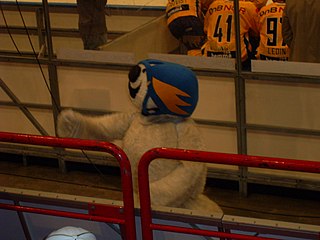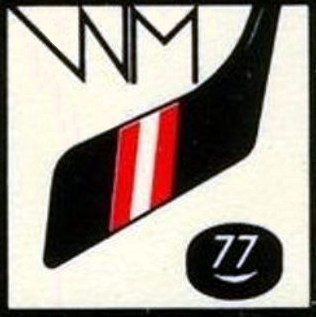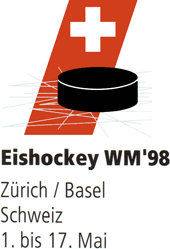
The men's ice hockey tournament at the 1994 Winter Olympics in Lillehammer, Norway, was the 18th Olympic Championship. Sweden won its first gold medal, becoming the sixth nation to ever win Olympic ice hockey gold. The tournament, held from 12 February to 27 February, was played at the Fjellhallen in Gjøvik and the Håkons Hall in Lillehammer. There was no women's tournament at the Olympics until 1998.
The 1998 Men's Ice Hockey World Championships was the 62nd such event sanctioned by the International Ice Hockey Federation (IIHF). Teams representing 40 countries participated in several levels of competition. The competition also served as qualifications for group placements in the 1999 competition.

The 1995 Men's Ice Hockey World Championships was the 59th such event sanctioned by the International Ice Hockey Federation (IIHF). Teams representing 39 countries participated in several levels of competition. The competition also served as qualifications for group placements in the 1996 competition.

The 1997 Men's Ice Hockey World Championships was the 61st such event sanctioned by the International Ice Hockey Federation (IIHF). Teams representing 36 countries participated in several levels of competition, while three other teams competed in an exhibition tournament to gain experience before joining on an official basis in the 1998 competition. The competition also served as qualifications for group placements in the 1998 competition.
The 1996 Men's Ice Hockey World Championships was the 60th such event sanctioned by the International Ice Hockey Federation (IIHF). Teams representing 36 countries participated in several levels of competition, with Slovakia making their first appearance in the top Champions Group A, in their fourth tournament since the dissolution of Czechoslovakia and the formation of the separate Czech Republic and Slovakia men's national ice hockey teams. The competition also served as qualifications for group placements in the 1997 competition.

The 1993 Men's Ice Hockey World Championships was the 57th such event sanctioned by the International Ice Hockey Federation (IIHF). Teams representing 32 countries participated in several levels of competition, with an additional six national teams failing to advance from mid-season preliminary qualifying tournaments. The competition also served as qualifications for group placements in the 1994 competition.
The 1992 Men's Ice Hockey World Championships was the 56th such event sanctioned by the International Ice Hockey Federation (IIHF). Teams representing a record 32 countries participated in several levels of competition. The competition also served as qualifications for group placements in the 1993 competition.

The 1991 Men's Ice Hockey World Championships was the 55th such event sanctioned by the International Ice Hockey Federation (IIHF), and at the same time served as the 66th and last Ice Hockey European Championships. Teams representing 25 countries participated in several levels of competition. The competition also served as qualifications for group placements in the 1992 competition.
The 1990 Men's Ice Hockey World Championships was the 54th such event sanctioned by the International Ice Hockey Federation (IIHF), and at the same time served as the 65th Ice Hockey European Championships. Teams representing 28 countries participated in several levels of competition. The competition also served as qualifications for group placements in the 1991 competition.

The 1985 Ice Hockey World Championships took place in Prague, Czechoslovakia from 17 April to 3 May. Eight teams took part, with each team playing each other once. The four best teams then played each other once more with no results carrying over, and the other four teams played each other again to determine ranking and relegation. This was the 50th World Championships, and also the 61st European Championships of ice hockey. The home side, Czechoslovakia, became world champions for the 6th time, and the Soviet Union won their 23rd European title. For the European Championship, only games between European sides in the first round are included.
The 1982 Ice Hockey World Championships took place in Finland from the 15 April to the 29 April. The games were played in Helsinki and Tampere with eight teams playing a single round-robin, followed by the top four teams playing each other once more. This was the 48th World Championships, and also the 59th European Championships of ice hockey. The Soviet Union became World Champions for the 18th time, and also won their 21st European Championship.
The 1981 Ice Hockey World Championships took place in Sweden between 12 and 26 April 1981, with games being played in the arenas of Scandinavium in Gothenburg and Johanneshovs isstadion in Stockholm. Eight teams took part, first splitting into two groups of four, with the best two from each group advancing to the final group. These teams then play each other in the final round. This was the 47th World Championships, and also the 58th European Championships. The Soviet Union became World Champions for the 17th time, and also won their 20th European title. Don Cherry commented, "This is the best Russian team I've ever seen."
The 1978 Ice Hockey World Championships took place in Prague, Czechoslovakia from 26 April to 14 May. Held at the Sportovní hala ČSTV in the capital city, it was the sixth time Czechoslovakia hosted the competition. Eight teams took part, with each team playing each other once in the first round, and then the four best teams meeting in a new round. This was the 45th World Championships, and also the 56th European Championships. The USSR won for the 15th time, narrowly defeating the incumbent Czechoslovaks.

The 1977 Ice Hockey World Championships took place in Vienna, Austria from 21 April to 8 May. Eight teams took part, first playing each other once, then the four best teams advancing to a new round. The tournament was also the 55th ice hockey European Championship. Czechoslovakia won for the fifth time, and second in a row, claiming their 14th and final European title as well.
The 1976 Ice Hockey World Championships were the 43rd Ice Hockey World Championships and the 54th European Championships in ice hockey. The tournament took place in Poland from 8 to 25 April, and the games were played in Katowice. Eight teams took part in the main tournament, with each team first playing each other once. The four best teams then took part in a medal play off, and the teams placed 5–8 took part in a relegation play-off. The teams took the results from the first round through to the second round with them.
The 1975 Ice Hockey World Championships were the 42nd Ice Hockey World Championships and the 53rd European Championships of ice hockey. The tournament took place in West Germany from 3 to 19 April and the games were played in Munich and Düsseldorf. Six teams took part in the main tournament, each playing each other twice. The Soviet Union won all of their games, and became World Champions for the 14th time, and won their 17th European title.

The 1973 Ice Hockey World Championships were the 40th Ice Hockey World Championships and the 51st European Championships of ice hockey. The tournament took place in the Soviet Union from 31 March to 15 April and the games were played at the Palace of Sports of the Central Lenin Stadium in Moscow.
The 1972 Ice Hockey World Championships was the 39th edition of the Ice Hockey World Championships. The tournament was held in Prague, Czechoslovakia from 7 to 22 April 1972, and the Czechoslovakia national team won the tournament, the third time they had done so and first since 1949, ending the Soviet Union's streak of nine consecutive titles. In addition it was the Czechoslovaks' 12th European title.
The 1963 Ice Hockey World Championships was the 30th edition of the Ice Hockey World Championships. The tournament was held in Stockholm, Sweden from March 7 to March 17, 1963. The Soviet Union won the tournament for the third time, starting their roll of nine straight championships. For the Soviets it was also their seventh European title.

The 1998 IIHF World Championship was held in Switzerland from 1–17 May 1998. The format expanded to 16 teams for the first time. The teams were divided into four groups of four with the top two teams in each advancing to the next round. The two groups of four then played a round robin with the top two teams in each moving on to the semi-finals. The semi-finals were a two-game total goals for series as was the final.









